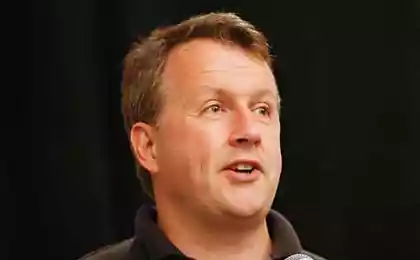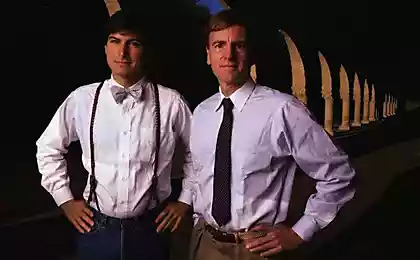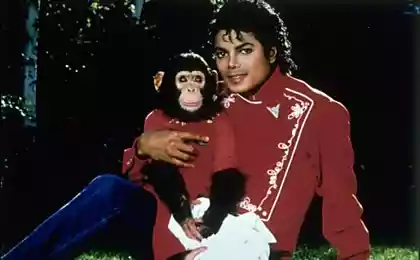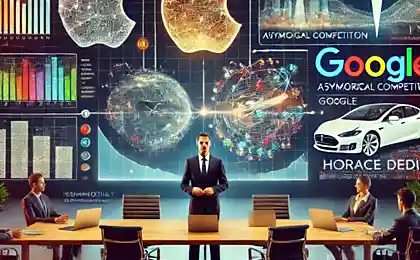438
Michael Moritz: how to build a company for the ages
The head of Y Combinator Sam Altman interviewed the famous head of Sequoia Capital of Michael Moritz about how to make your business and your personal success is long — term.
Recently, Michael Moritz gave a lecture at Y Combinator. One of the questions I asked him —how to create a company, which constantly generates innovation and remains at the top of the industry for decades. Fund Sequoia Capital has achieved exactly this, and I think this is the most difficult in business. The answer was so brilliant that I asked Michael's permission to publish it, which we don't normally do (our dinners are not for the General public, so the speakers can tell the real story).

Here is the answer — and another question that helps Michael to motivate yourself.
Sam Altman:When you look back on what made Sequoia, which allowed her to remain the industry leader which values and practices of the company you would have noticed? What can you advise others who want to achieve the same?
Michael Moritz: Most of you, when you see an old fart like me, I think: "Here sits a bag of money". Or worse. But what do you think — and I'm not criticizing, because you have no reason to think about it is about what we need to build, direct, maintain, develop and improve our business. Without this we cannot hope for any impressive investment.
A guy named don Valentine founded Sequoia in the early 1970s. If you remember which companies have prospered in Silicon valley in the seventies, and which continue to flourish forty years later, you probably remember the loud once the names Digital Equipment, Data General, Silicon Graphics, Compaq Computer, Lotus Development, Software Publishing, VisiCorp, Cray Computer, and all the others who were once great and are now left on the sidelines. Or remember a lot of venture capital firms, which for a moment shone in the 70s, 80s, 90s or early 2000s, but now or even out of the game, or lost your head, lost its meaning, and left a shadow.
This is what we in Sequoia always thought: how can we constantly maintain an outstanding result? Most organizations are able to do this year, five years, sometimes ten years. Very few are able to do for decades. And I'm not saying that we're just a model company, but we really worked hard to act on an extremely high level.
Yesterday is no longer relevantAs we have achieved it? This is going to sound very ordinary. You can read the book on the principles ofhigh-performance, real leadership, and all this is going to sound obvious and primitive. The difficulty is to act on it every week, every month, quarter, year, and maintain this rhythm.
It was one of the features Steve jobs, is one of the features of Larry page, Jeff Bezos or reed Hastings. Are the leaders capable of that? How do they do it?
They want to guarantee the product freshness, the ability to change after time. They never rest on their laurels, never rest, they always feel some anxiety that they can swallow a competitor, and understand that past success is not so much.
Including why we don't hang in our office plaques about so-and-so or so-and-so's anniversary: because it's about yesterday, and he's in the future means nothing.
The fresh teamthe Second point — the need to focus on the team. You should be able to field the best team at any time, regardless of how much time working with certain people. No need to be unfair, ruthless, harsh; you need a detached, objective, analytical to treat the results of each person. No matter how successful they were in the past, how many successful investments they have made — if their heart is now somewhere in other place if they don't have that burning desire to compete, for them it's time to move on. It is impossible to keep such people in the team. Look for those who have the zeal, ambition, energy. And grow the team organically.
No need to chase people, who have 30 years of experience in your industry. We also hired experienced people, but they were still at the age when they understood that he came to difficult business, that they need to re-learn and that they have a real drive and desire to succeed. In short, we are constantly updating the team.
Change with the market,keep an eye out for market opportunities. When we started this business a long time ago, we were sitting here in Menlo Park, and the world of technology has varied. The world of the companies that you are launching today, is radically different from what we saw 30 or 40 years ago, including what is happening in China. And here 12-13 years ago we opened the business in China, because we felt that over time and for Sequoia, and companies in which we invest in Silicon valley, will be increasingly important to understand the Chinese market and what will happen there.
When we started this business, everyone was against us. All told, what we fail that we have too many imagines about himself that we become another American company that will teach China. But thanks to our Chinese employees, and the tremendous efforts of the masses of people our business in China is booming. It is not my merit, it is the merit of those who work there, in China. And it's very, very difficult.
I don't want to brag, because we have done a lot of mistakes, a lot of things we would now do differently. But the fact is that we remember all the time: we are always on the verge of failure.
Sam Altman: It's a terrific answer. What inspires you most, thirty years later?
Michael Moritz: Oh, for me it is a challenge to defeat all the leaders. If you are starting a new company or participate in it or help the company in the process of its growth it is always in spite of everything. The whole world is betting against you. And large companies think they'll crush this little company because they have so many resources.
Take Instacart. Why is Sequoia so I like to work with Instacart? All think it's stupid task. They ask: "have you not read what happened to Webvan?" And we didn't have to read. We have invested in Webvan. "But perhaps Amazon won't kill you?" "And is it possible with a normal business model?" "It's such a low-margin business?"
Yes, Yes, Yes. Solid negativity. Now, nam a pleasure to deal with a smart management team they've put together to prove all these detractors wrong. And the same argument could be leveled against Airbnb, Stripe, Dropbox, and other companies-graduates of Y Combinator, in which we have invested.
It's an incredible pleasure to poke a finger in all these fat cats who bet against you. This is why I love what I do. published
P. S. And remember, only by changing their consumption — together we change the world! ©
Join us in Facebook , Vkontakte, Odnoklassniki
Source: ideanomics.ru/?p=5419
Recently, Michael Moritz gave a lecture at Y Combinator. One of the questions I asked him —how to create a company, which constantly generates innovation and remains at the top of the industry for decades. Fund Sequoia Capital has achieved exactly this, and I think this is the most difficult in business. The answer was so brilliant that I asked Michael's permission to publish it, which we don't normally do (our dinners are not for the General public, so the speakers can tell the real story).

Here is the answer — and another question that helps Michael to motivate yourself.
Sam Altman:When you look back on what made Sequoia, which allowed her to remain the industry leader which values and practices of the company you would have noticed? What can you advise others who want to achieve the same?
Michael Moritz: Most of you, when you see an old fart like me, I think: "Here sits a bag of money". Or worse. But what do you think — and I'm not criticizing, because you have no reason to think about it is about what we need to build, direct, maintain, develop and improve our business. Without this we cannot hope for any impressive investment.
A guy named don Valentine founded Sequoia in the early 1970s. If you remember which companies have prospered in Silicon valley in the seventies, and which continue to flourish forty years later, you probably remember the loud once the names Digital Equipment, Data General, Silicon Graphics, Compaq Computer, Lotus Development, Software Publishing, VisiCorp, Cray Computer, and all the others who were once great and are now left on the sidelines. Or remember a lot of venture capital firms, which for a moment shone in the 70s, 80s, 90s or early 2000s, but now or even out of the game, or lost your head, lost its meaning, and left a shadow.
This is what we in Sequoia always thought: how can we constantly maintain an outstanding result? Most organizations are able to do this year, five years, sometimes ten years. Very few are able to do for decades. And I'm not saying that we're just a model company, but we really worked hard to act on an extremely high level.
Yesterday is no longer relevantAs we have achieved it? This is going to sound very ordinary. You can read the book on the principles ofhigh-performance, real leadership, and all this is going to sound obvious and primitive. The difficulty is to act on it every week, every month, quarter, year, and maintain this rhythm.
It was one of the features Steve jobs, is one of the features of Larry page, Jeff Bezos or reed Hastings. Are the leaders capable of that? How do they do it?
They want to guarantee the product freshness, the ability to change after time. They never rest on their laurels, never rest, they always feel some anxiety that they can swallow a competitor, and understand that past success is not so much.
Including why we don't hang in our office plaques about so-and-so or so-and-so's anniversary: because it's about yesterday, and he's in the future means nothing.
The fresh teamthe Second point — the need to focus on the team. You should be able to field the best team at any time, regardless of how much time working with certain people. No need to be unfair, ruthless, harsh; you need a detached, objective, analytical to treat the results of each person. No matter how successful they were in the past, how many successful investments they have made — if their heart is now somewhere in other place if they don't have that burning desire to compete, for them it's time to move on. It is impossible to keep such people in the team. Look for those who have the zeal, ambition, energy. And grow the team organically.
No need to chase people, who have 30 years of experience in your industry. We also hired experienced people, but they were still at the age when they understood that he came to difficult business, that they need to re-learn and that they have a real drive and desire to succeed. In short, we are constantly updating the team.
Change with the market,keep an eye out for market opportunities. When we started this business a long time ago, we were sitting here in Menlo Park, and the world of technology has varied. The world of the companies that you are launching today, is radically different from what we saw 30 or 40 years ago, including what is happening in China. And here 12-13 years ago we opened the business in China, because we felt that over time and for Sequoia, and companies in which we invest in Silicon valley, will be increasingly important to understand the Chinese market and what will happen there.
When we started this business, everyone was against us. All told, what we fail that we have too many imagines about himself that we become another American company that will teach China. But thanks to our Chinese employees, and the tremendous efforts of the masses of people our business in China is booming. It is not my merit, it is the merit of those who work there, in China. And it's very, very difficult.
I don't want to brag, because we have done a lot of mistakes, a lot of things we would now do differently. But the fact is that we remember all the time: we are always on the verge of failure.
Sam Altman: It's a terrific answer. What inspires you most, thirty years later?
Michael Moritz: Oh, for me it is a challenge to defeat all the leaders. If you are starting a new company or participate in it or help the company in the process of its growth it is always in spite of everything. The whole world is betting against you. And large companies think they'll crush this little company because they have so many resources.
Take Instacart. Why is Sequoia so I like to work with Instacart? All think it's stupid task. They ask: "have you not read what happened to Webvan?" And we didn't have to read. We have invested in Webvan. "But perhaps Amazon won't kill you?" "And is it possible with a normal business model?" "It's such a low-margin business?"
Yes, Yes, Yes. Solid negativity. Now, nam a pleasure to deal with a smart management team they've put together to prove all these detractors wrong. And the same argument could be leveled against Airbnb, Stripe, Dropbox, and other companies-graduates of Y Combinator, in which we have invested.
It's an incredible pleasure to poke a finger in all these fat cats who bet against you. This is why I love what I do. published
P. S. And remember, only by changing their consumption — together we change the world! ©
Join us in Facebook , Vkontakte, Odnoklassniki
Source: ideanomics.ru/?p=5419























